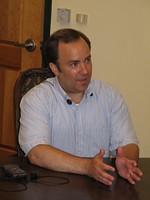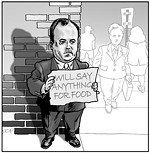Neighbor Helping Neighbor: McClellan and Bush
Selections from 'What Happened'
Fri., June 20, 2008
To me, leadership means uniting people around a common purpose, rather than dividing them along ideological lines, and I found Governor Bush's leadership inspiring. He adroitly joined forces with [Bob] Bullock and [Pete] Laney to build and sustain a strongly bipartisan, collegial approach to governing.
Could his leadership usher in a new political dynamic on the national level too, as it had in Texas? Many younger people were looking for just such a change. After all, shouldn't politics be about something higher and better than what our leaders in Washington were delivering?
In January 2002, the first cracks appeared in the facade of bipartisan comity. During an open press Republican National Committee meeting in Austin, Karl Rove stated that the GOP would make the president's leadership in the war on terror the top issue for retaining control of the House and winning back the Senate in the midterms.
Rove was the first administration official to publicly make the case for using the war as a partisan issue, a marked shift in tone from Bush's repeated emphasis on unity and bipartisanship in confronting radical Islamic terrorism.
I asked Karl an unambiguous, unqualified catch-all question, "Were you involved in this in any way?" I was clearly referring to the leaking of Valerie Plame's identity – information that was believed to be classified – to any reporter.
Karl replied categorically, "No. Look, I didn't even know about his wife."
There was no mention of a phone conversation Karl had on July 11, 2003, with Time magazine's newest White House Correspondent, Matt Cooper, which would remain under "double super secret" anonymity (Cooper's wit, not mine) for nearly two more years. That is when it would be revealed publicly and to me that Rove had disclosed Plame's identity to Cooper during that call.
Rove's categorical "no" gave me the assurance that I needed to defend a fellow member of the Bush team and a fellow Texan I had known for more than a decade, who was invariably a prime target of our most partisan critics.
I still like and admire George W. Bush. I consider him a fundamentally decent person, and I do not believe he or his White House deliberately or consciously sought to deceive the American people. But he and his advisers confused the propaganda campaign with the high level of candor and honesty so fundamentally needed to build and then sustain public support during a time of war. Had a high level of openness and forthrightness been embraced from the outset of his administration, I believe President Bush's public standing would have been stronger today. His approval ratings have remained at historic lows for so long because both qualities have been lacking to this day. In this regard, he was terribly ill-served by his top advisers, especially those involved directly in national security.
Got something to say on the subject? Send a letter to the editor.








